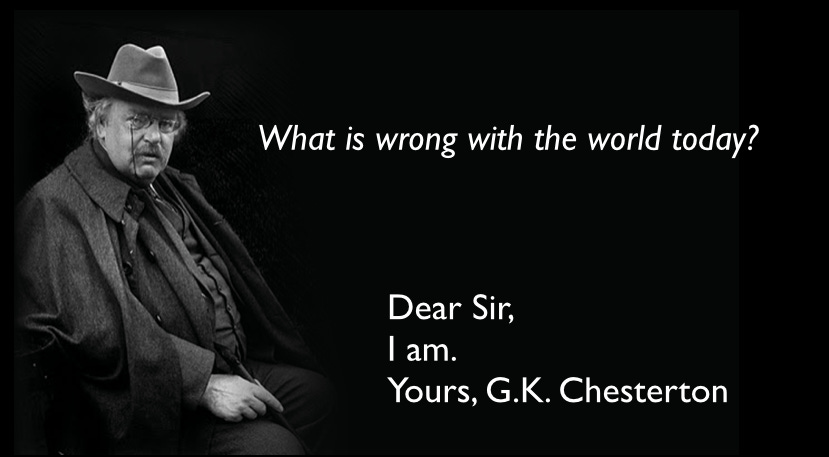Almost two years ago, I wrote about reframing as an act of leadership to help others “go and see” things in a different way, perhaps more positively. I also see that as a kind of counter-recipe for frustration, by focusing on what I can control.
It’s not by chance that I have turned this post into an end of year tradition for the newsletter. I honestly believe that Chesterton’s answer (see picture below) is not only a powerful thing but a way to go about in the world with a degree of humility that feeds action.
Source: https://www.petesantucci.com/whats-wrong-with-the-world-i-am/
Chesterton would later on make an addendum:
"What is wrong is that we don't ask (sufficiently) what is right."
In other words, he proposed that we can reframe the whole situation by asking a better, more enabling question. I think a lot about that… and more importantly, I try to make it part of my own practice in work.
For instance, I try to help teams that feel kind of stuck by the imposed planning constraints in organizations (like when a quarterly planning event is in place):
Focus on what can be done to sequence and deliver more incrementally within the quarter, as a stepping stone.
What if we could build in some flexibility in terms of scope by at least focusing on defining goals for the quarter, instead of a fairly fixed scope?
I do believe too many people don’t quite grasp how much they can act upon their own agency. Just because too many don’t even try to do something slightly different…
I recently made a case that ultimately can too be linked to a way to reframe an important issue… I suggested that in many situations instead of trying to answer a more complex question of what value is, we can focus on what we can more easily control, which is the investment (cost / effort) we put in.
The tangible result of that is reframing and using time as a kind of enabling constraint…
Am I willing to make that sort of (forecasted) investment to solve this? Is it worth that much “of trouble”?
Or better yet – what’s the [fill up your reasonable investment of time or level of ambition] version of making progress on solving this?
In other words, while it may sound rather nuanced for some, I do believe that reframe is quite fundamental, and can truly empower teams, putting them much more on the reins of their faith, so to speak.
This piece likely fits in one of those of either reinforcing the obvious, or giving a new insight for someone rather fresh in the market. Either way, worth articulating, because from what I observe, directly or indirectly, too often individuals and teams feel somehow stuck in their current ways and sort of "victims of their own circumstances” in the context that is around them.
To which I’d like to encourage…
Isn’t there another way to look at things? Aren’t there better questions we can ask and focus on instead of the ones we’ve been trying to answer and perhaps not getting as much traction as we’d like to!?
Go and try to reframe it! Help yourself to see things in a different way – and hopefully some of the examples I gave are helpful as a practical insight.
By Rodrigo Sperb, feel free to connect, I'm happy to engage and interact. If I can be of further utility to you or your organization in getting better at working with product development, I am available for part-time advisory, consulting or contract-based engagements.



